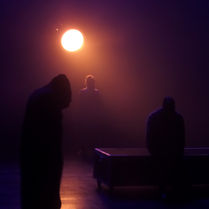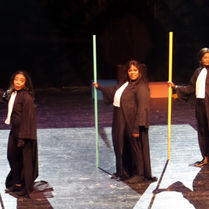Taksim and Joubran in Tunisia : musical technicality, breathtaking melodies and broken hearts
- Mohamed Ali Elhaou

- Aug 18, 2023
- 4 min read
Updated: Aug 20, 2023
In an Arab song world where for example Ahmed Saad, Ragheb Alema, Latifa Arfaoui are flourishing, very few know and listen to the Taksim trio and the Joubran trio on a daily basis. This is the unpretentious reality, since this music is not played in the mass media and is not commercial. Nevertheless, these two groups succeeded in attracting a large, well-informed audience. Over the course of an hour and a half, they managed to make the Carthage Festival, at the same time, a place of catharsis and of happiness in a night that will remain in the annals of our country's cultural events. It was August 14, 2023, and the highlight of the week.

First of all, the show is a very original one. For the first time, it brings together the Taksim group, which is used to taking all the show for itself, and the Joubran group, which is, all things considered, the Ons Jabeur of instrumental music in the world. The latter group has become accustomed to performing in the world's greatest concert halls, but very few in Arab countries. Indeed, the Joubran trio has a special affection for our country.
The Taksim trio, Turkey's musical monsters
The Taksim trio, a group of Turkish instrumentalists, is made up of Ismail Tunçbilek. He is an expert on the Bağlama, an instrument derived from the saz, and Turkish singing. In fact, he used to say to the spectators: "I don't speak your language or any other language, but I do speak a universal language which is music". On clarinet was Hüsnü Selendirici, and on qanun was the great Aytaç Dogan, who has visited us many times, most recently in mid-April 2023. The latter is better known than the band itself and is a terrible champion of music, particularly Arabic and Oriental tunes.
The Taksim trio played for an hour, starting at 10 p.m. sharp. As a gift to the audience, they offered the famous Saliha Ah-ouadôuni song. To communicate to the crowd, it was always Aytaç Dogan who took the floor, speaking in Arabic by an Egyptian accent. The band's presence at this concert may be seen as the fruit of Turkish diplomacy, but it's a big mistake to associate it to the world of politics and its invisible stakes. In fact, Taksim trio's music is truly universal, even if some of the tracks they play are reminiscent of Turkish soap operas and soft power, if you push the analysis a little.
The Joubran trio, eagles of Palestine
The Joubran trio is composed of Samir the eldest, Wissam the middle son and Adnan the youngest. The Joubran band makes music that derives from the pure Arab soul and its Mouachah. The company was formed in 2004 by the three brothers, who drank the oud's sap at a very early age since they descend from an ancestral family in the making of this instrument and are known throughout the land of the rising sun. The tunes and melodies of the Joubran trio are dynamic, refined and full of power and enthusiasm. The trio has been working with percussionist Youssef Hbeisch, their compatriot, since 2007, and he was present at the Carthage concert on that wonderful evening of August 14. Since 2010, the Joubran trio has incorporated the poetry of Mahmoud Darwish into its band identity. The words of this great committed poet are not set to music but rather go with the verses played by the three brothers. Iranian percussionist Habib Meftah was also present on stage of Carthage theater, for this unprecedented concert. He knows our country very well, having played in several concerts, notably in Hammamet in 2016.
The three Joubrans are truly eagles. They fly over the borders of the world in the company of their music and also have piercing, twirling, shining eyes and a smile full of energy and cunning. They can be seen as eternally restless children that have an overflowing will. They are attentive to every breath and every word spoken. They adapt very quickly to the environment in which they find themselves, and are extremely sensitive. Big brother Samir, who will soon be in his fifties, now lives in Ramallah, and the other two brothers are based in Europe, between Italy, France and Belgium. In their own words, their music is committed by default, but this involvement cannot be achieved without a great aesthetic in the choice and composition of the pieces played mainly on the oud. According to them, this instrument is an energetic tool that expresses itself through strength, power and resistance; given the context of battle and war in which it was born, i.e. in an Arab community in 1948.
They believe that expressing Palestinian pain and raising awareness of the Palestinian cause of liberation through deep, sophisticated and innovative music is far more important than sticking to a politicized, static musical engaged style. Their aim is to create a beautiful aesthetic and a music that touches the universal soul, making the oud a star in the encyclopedia of international music and its heavy history. To the concertgoers, the trio performed a song by the late singer Thikra Mohamed, Wahyati andak. The Joubran trio's love for our land was obvious. The whole troupe pulled off a memorable concert, from which it's hard not to emerge unscathed, to weep, or at least to feel the pain and melancholy communicated by the tremors of the oud. It's a showcase for the noble feelings that come from being a human being, working for peace and, above all, for the liberation of an oppressed people through a quiet instrument in an "Age of industry".
Mohamed Ali Elhaou
Nota bene: this article is written originally in french. Please find the genuine link: https://realites.com.tn/fr/taksim-et-joubran-a-carthage-technicite-musicale-melodies-a-couper-le-souffle-et-coeurs-enivres/









































Comments